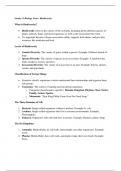Class notes
Biodiversity: Understanding the Variety of Life on Earth
- Course
- Biology
- Institution
- 11th Grade
This document provides a detailed yet simplified overview of the Biodiversity unit for Grade 11 Biology. It covers key topics such as the levels of biodiversity, the classification of living organisms, taxonomy, and the significance of biodiversity. The document also discusses threats to biodiversi...
[Show more]



